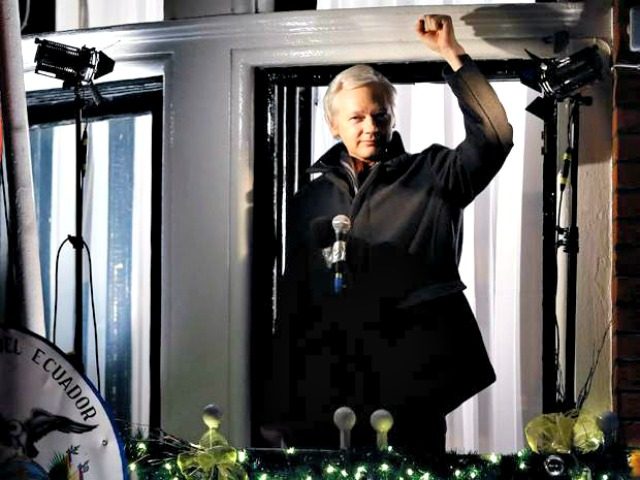The socialist government of Ecuador has confirmed that it deliberately cut Wikileaks leader Julian Assange’s internet access to prevent him from interfering in the 2016 U.S. presidential election.
In an official statement, Quito confirmed that Assange’s access to the internet from within Ecuador’s UK embassy was cut in response to Wikileaks’ publications of hacked private emails from the account of Clinton campaign chairman John Podesta.
“Ecuador has exercised its sovereign right to temporarily restrict access to some of its private communications network within its Embassy in the United Kingdom,” the Ecuadorian Foreign Relations Ministry said. “This temporary restriction does not prevent the WikiLeaks organization from carrying out its journalistic activities.”
“The government of Ecuador respects the principle of nonintervention in the affairs of other countries, and it does not interfere in the electoral processes in support of any candidate in particular,” the statement continued, asserting that Wikileaks’ latest publications were, in fact, intended to sway the U.S. presidential election against Democratic nominee Hillary Clinton.
While the statement noted that the “nonintervention” policy required the government to disconnect Assange, they reiterated their support for Assange generally, stating that they will continue to allow him to live in their embassy.
“Ecuador, consistent with its tradition of defending human rights, especially with victims of political persecution, reaffirms the asylum granted to Julian Assange and reiterates its intention of safeguarding his life and physical integrity until he can move to a safe place,” the statement read.
Correa has stated publicly that, if he were American, he would vote for Hillary Clinton.
On Tuesday, Wikileaks accused Ecuador through its Twitter account of having cut off Assange’s internet access in response to a personal request from Secretary of State John Kerry. The Wikileaks tweets claimed that Kerry had approached leftist President Rafael Correa in September asking for Ecuador to prevent Assange from publishing the Podesta emails. Both Correa and Kerry were in Cartagena, Colombia in September for an event in which Colombian President Juan Manuel Santos and Marxist terror chief “Timochenko” of the Revolutionary Armed Forces of Colombia (FARC) signed a peace agreement. The agreement, which would have allowed the FARC to use its drug profits to establish a political party, was almost immediately invalidated through popular vote.
Correa’s government has denied that the meeting took place or that their decision to cut Assange’s internet had anything to do with pressure from the United States. As Correa has built his reputation on being an anti-American advocate for alliances with rogue governments like Russia and Syria, accepting such a request from John Kerry would be politically embarrassing for Correa.
The U.S. State Department has also denied that the conversation took place. “While our concerns about WikiLeaks are longstanding, any suggestion that Secretary Kerry or the State Department were involved in shutting down WikiLeaks is false,” State Department spokesman John Kirby said Tuesday.
Wikileaks has already begun fundraising off the Ecuadorian government’s admission that it purposefully shut Assange’s internet off, and has also begun agitating on Twitter against an alleged conspiracy to label Assange a “pedophile.”
Assange is not being kept in the Ecuadorian embassy for political reasons. He is facing multiple charges of sexual assault in Sweden, including forcing himself on women after refusing to agree to using protecting. As the UK has an extradition agreement with Sweden, leaving the embassy in London would result in his immediate arrest.

COMMENTS
Please let us know if you're having issues with commenting.